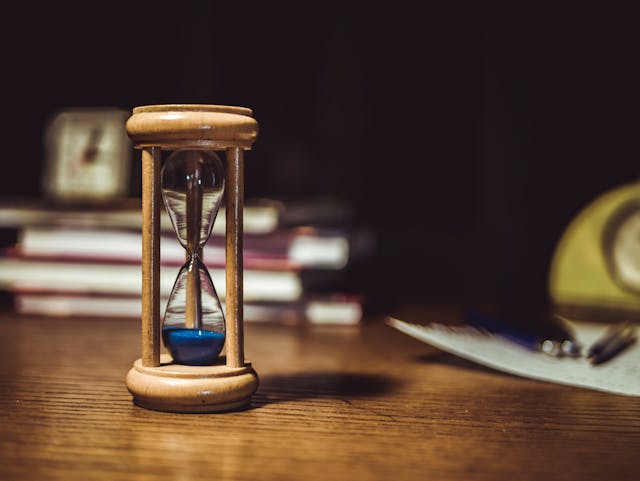关于时间的一些说法 Journey through time
China Today 2024-05-25 09:00


If you have 时间 (shí jiān), time, I will take a moment to explore 时间观念 (shí jiān guān niàn), Chinese notions of time.
The character for 时 (shí), time, originally written 时, is a compound of three elements: 日 (rì), sun or day, 土(tǔ) , derived from 止(zhǐ), advance, and 寸 (cùn), meaning "take hold of" in ancient times. The four seasons are called 四时 (sì shí). When followed by 间 (jiān), space, it forms the word 时间 (shí jiān), which can be understood as "a space of time." A similar expression is 时空 (shí kōng), time and space.
Understandably, the characters for sun and day are often associated with duration. The sun was the most primitive way to 计算时间 (jì suàn shí jiān), measure the passage of time.
Where does the expression 昼夜 (zhòu yè), day and night, come from? In Chinese, it means a full day but also means "all the time." 现在 (xiàn zài), right now, it is the 早晨 (zǎo chen), morning, and we have 一天的时间 (yì tiān de shí jiān), a whole day, before us to embark on a 时空旅行 (shí kōng lǚ xíng), journey through time, and lose some of our cultural and temporal preconceptions. Einstein believed that traveling through space/time is like chasing after light. The Chinese have discovered this long ago, so another way to describe time is 时光 (shí guāng), literally "time and light."
We are 时常 (shí cháng), often, 赶时间 (gǎn shí jiān), chasing after time, and too 经常 (jīng cháng), frequently, get the impression that it passes too quickly. This is the reason for the exclamation 时光飞逝 (shí guāng fēi shì) , time flies. 美好时光 (měi hǎo shí guāng), good times, are 一时的 (yì shí de), ephemeral, or literally "momentary." We often regret being unable to 时光倒流 (shí guāng dào liú), go back in time. If only we could invent a 时光机 (shí guāng jī), time machine.
I speak and speak and little by little, 光阴荏苒 (guāng yīn rěn rǎn), time flows by. Hours pass, 岁月 (suì yuè), years and months, come and go. The 时代 (shí dài), epochs, change and 四季更迭 (sì jì gēng dié), the seasons turn.
Since childhood our parents told us to make the best use of every day, and not to 浪费时间 (làng fèi shí jiān), waste time. Because 时间是金钱 (shí jiān shì jīn qián), time is money, and 时间不等人 (shí jiān bù děng rén), time waits for no man. Worse, 岁月不饶人 (suì yuè bù ráo rén), it does not spare anyone...
But before thinking about these bigger issues about time, you have to know how to read a 手表 (shǒu biǎo), wrist watch, which tells the 小时 (xiǎo shí), hour, 半个小时 (bàn ge xiǎo shí), half hour, 刻 (kè) , quarter, 分 (fēn), minute, and 秒 (miǎo), second. I look down at my watch and note that the hour is different from that of my 挂钟 (guà zhōng), wall clock. Do I have to 调时间 (tiáo shí jiān), adjust it? Is there 时差 (shí chā), a time difference, between the wall and my arm? Or perhaps, like Alice’s White Rabbit, am I 迟到了 (chí dào le), late? Maybe like Dali’s watch, time is beginning to melt...
I think about time all the time, 朝思暮想 (zhāo sī mù xiǎng), from morning till midnight, 日日夜夜 (rì rì yè yè), all day and all night, and the same during my 自由时间 (zì yóu shí jiān), free time...
What do you say? There might be free time? But 时间都去哪儿了(shí jiān dōu qù nǎr le), where has it gone?
来源:China Today
编辑:万月英

















 英语点津微信
英语点津微信 双语小程序
双语小程序